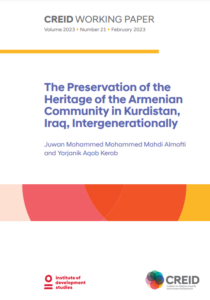Mahesh Rana

A local builder had the audacity to destroy a pre-partition temple along with 22 houses in the vicinity and added to the insecurities of an already marginalized Hindu community in Sindh.
“I was completely shattered to see the temple destroyed. It’s the one that I have been going to since I was born. I remember the pictures I had at the temple with my parents and grandparents”, told Muhammad Kutchi – a local resident. The pre-partition Hanuman temple was illegally demolished in Lyari, Karachi. The onslaught on cultural heritage and a site of worship was made worse by the additional damage in the form of 22 houses that were razed to the ground. These 22 families belonged to the religious minority community of Hindus residing in the vicinity of the temple.

Demolition and conversion of minority places of worship are not new in Pakistan. Every now and then a new controversy stirs up, either a temple being bulldozed away or turned into a mosque.
Earlier in 2020, the Government of Pakistan announced PKR 100 million to build Krishna temple in Islamabad, whose construction was halted and boundary walls were demolished within days.
Mohan Lal, a 60-year-old resident of Lyari informed that “the builder mafia wanted to construct a building at the temple site. Some of the families living in the area were given cash as compensation for vacating their houses. An agreement was also signed that each family would be allotted an apartment once the new building is set up”. The agreement between both the parties was verbal in and no commitment was sealed in writing.
“The Hindu families did not agree to the temple demolition because of the religious, sentimental, and historical value attached to it. However, they agreed to give up their compounds in order to resettle in the newly constructed building. But after a few weeks, the builders not only demolished their houses but also the Hanuman temple”, told Mohan Lal.
Seema Maheshwari, a Hindu social activist, shared the whole scenario in detail. He accused a builder who had been threatening the community to vacate the location. “The community members gathered at the site and tried to enter the temple to protest against the demolishing but were denied entry”, informed Mr. Maheshwari.
“No one was allowed to visit the temple during the lockdown. The builder took advantage of the lockdown and destroyed it”, told Ravi Chauhan, social activist, and journalist. He demanded the restoration of the temple and shared the hurt sentiments of the Hindu community.

Residents of Lyari struggling for roofs above their heads during the pandemic situation
A 29-year-old female resident of Lyari shared that she was a housemaid and grew jobless due to the lockdown after the coronavirus outbreak. “All we had was a roof above our heads but the demolish pushed our family out onto the pavement”, she said.
The woman, who wished to remain anonymous, added that they later moved into a rented room. “It is really hard for us to pay the rent especially during the financial crisis caused by the pandemic”
“All we had was a roof above our heads but the demolish pushed our family out onto the pavement”A 29-year-old female resident of LyariSHARE14TWEET
The Hindu community of Lyari carried out protests in front of the temple, which is when the news was given coverage by the media. As Deputy Commissioner South, Mr. Irshad Ahmed Sodhar learned about the event, he sealed the area and formed an inquiry committee to investigate the matter. Mr. Irshad committed to thoroughly probe the matter and ensured that justice will be delivered to the community which is already marginalized in the country due to their religious belief.
Papoo Mahraj, a worker at Hanuman temple, went to Baghdadi police station to lodge a complaint against the builder but police didn’t register an FIR. “After meeting the Assistant Commissioner we realized that the official wanted to wrap up the matter informally by holding a negotiation between the Hindu community and the builder, to which we refused”, told Mohan Lal.
The community feels betrayed and unprotected, they refused to take money as compensation for the illegal demolishing of the temple and are still waiting to hear the news of its restoration.


